What you need to know about atrial septal defect
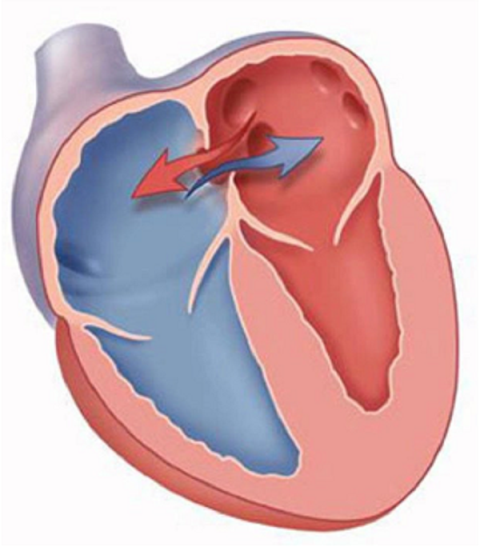
Atrial septal defect is a structural abnormality of the heart. This is also one of the most common congenital heart defects. So is this situation dangerous? Does this heart defect require surgery? Let SignsSymptomsList answer your questions about this heart defect.
content
- 1. Overview
- 2. What are the symptoms of atrial septal defect?
- 3. Cause
- 4. Risk factors for atrial septal defect
- 5. Complications caused by atrial septal defect
- 6. How to prevent atrial septal defect?
- 7. How is atrial septal defect diagnosed?
- 8. How is this condition treated?
1. Overview
Atrial septal defect is the occurrence of abnormal communication between the two atria. The human heart has four chambers, two atria and two ventricles. Normally, the two atria are separated by a septum. But when there is atrial septal defect, this septum is incomplete, thereby causing communication between the two chambers of the heart.
If the defect is small, it is possible that the child will not show any abnormality. Some cases of atrial septal defect resolve spontaneously after a few years. However, if the defect is large, it can seriously affect the child's heart and lung function. If detected in time, interventional methods or surgery can help correct this deformity.
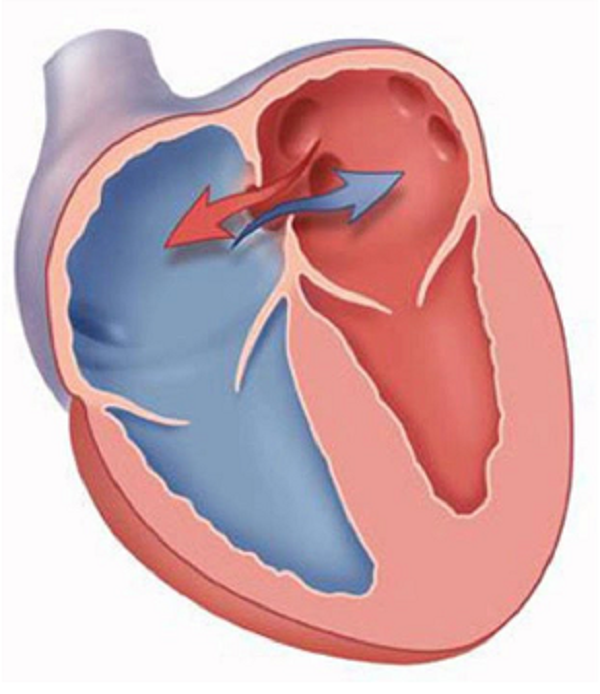
An atrial septal defect is a defect in which there is communication between the two atria in the heart
2. What are the symptoms of atrial septal defect?
Many infants with an atrial septal defect have no symptoms at birth. However, symptoms may appear later if the defect does not resolve on its own.
Symptoms of an atrial septal defect include:
- Shortness of breath , especially during exercise or exertion.
- Tired.
- Swollen feet, legs or ascites.
- Palpitations or arrhythmias.
- Stroke .
- An audible murmur in the heart (marked on examination).

Children may show signs of fatigue easily, especially when exercising
When should you take your child to the doctor?
Atrial septal defect needs to be diagnosed and treated early. Therefore, if your child has the following symptoms, take them to the doctor right away:
- Shortness of breath.
- Tired very easily, often observed when the child is active.
- Children swollen feet, ascites.
- The child has palpitations (feeling of a pounding heart) or irregular heartbeat.
3. Cause
How does the normal heart work?
The human heart is divided into four chambers, two on the right and two on the left. Through the beating mechanism of the heart, the heart pumps blood to other organs to nourish the body. The heart must bring blood to the lungs to exchange oxygen. Then, the oxygen-rich blood from the lungs will return to the left heart to go to the organs, supplying blood to the body.
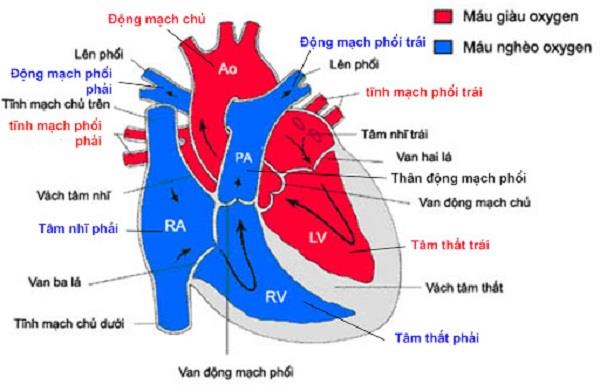
Structural diagram of a normal heart
So how does atrial septal defect appear?
While still a fetus, there are many factors that affect the formation of the baby's organs. When an abnormality occurs in the formation of the heart, the baby can have a congenital heart defect. Genetic and environmental factors can influence this process. However, the specific cause for each case is often not found.
So how does the heart work if there is an atrial septal defect?
A large atrial septal defect can increase blood flow to the lungs, thereby overloading the right heart. If not treated promptly, the right heart often enlarges and fails. Blood pressure in the lungs also increases, leading to pulmonary hypertension.
There are several types of atrial septal defect:
- Secondary atrial septal defect. This is the most common form of an atrial septal defect. Occurs in the middle of the interventricular septum.
- Primary atrial septal defect. The hole occurs in the lower part of the atria and may be associated with other heart defects.
- Atrial septal orifice venous septal defect. This defect is rare. Atrial septal defect occurs in the upper atrium and is also commonly associated with other heart defects.
- Atrial septal defect, coronary sinus. This is also a rare malformation.
4. Risk factors for atrial septal defect
The specific cause of an atrial septal defect is unknown. But some congenital heart defects run in families and are linked to genetic problems such as Down syndrome . If you have a heart defect, your baby may also be born with a heart defect.

Certain conditions during pregnancy can increase your baby's risk of heart defects
Some of the following cases may be related to the occurrence of birth defects in the fetus:
- Rubella infection during pregnancy. Infection with rubella , especially in the first months of pregnancy, can increase the chance of birth defects in the fetus.
- Using drugs, substances or alcohol during pregnancy. Certain drugs, tobacco, alcohol or banned substances such as cocaine when used can cause harm to an unborn baby.
- Gestational diabetes or lupus. These diseases also increase the risk of malformations.
5. Complications caused by atrial septal defect
Minor deformities may not cause problems. However, large heart defects can lead to dangerous conditions, such as:
- Right heart failure.
- Heart rhythm disturbances.
- Increased risk of stroke.
- Lifespan is shortened.
In addition, some less common but also very serious complications that can occur are:
- Pulmonary hypertension. Increased blood flow to the lungs can lead to increased blood vessel pressure in the lungs.
- Eisenmenger syndrome. Prolonged pulmonary hypertension can cause irreversible damage. Then Eisenmenger syndrome occurs, which usually occurs after several years in patients with large atrial septal defects.
Timely diagnosis and treatment can prevent these complications from occurring.
Women with atrial septal defect during pregnancy
Most women with an atrial septal defect are able to give birth without the problems it causes. However, if the defect is large enough or complications such as heart failure, pulmonary hypertension or arrhythmia occur, the risks of serious problems during pregnancy are quite significant.
Therefore, doctors recommend that women with Eisenmenger syndrome should not become pregnant. If they become pregnant, their lives may be in danger.
The chance that a child of parents with a heart defect will have a congenital heart disease is higher than a normal child. Therefore, people with congenital heart defects should receive pre-marital or antenatal counseling. At that time, the doctor will evaluate and give appropriate advice.
6. How to prevent atrial septal defect?
In most cases, atrial septal defect is not preventable. Therefore, when pregnant or planning to become pregnant, you should see a doctor for appropriate advice. Some of the things that will help you during your prenatal visit are:
- Get tested for rubella. Your doctor can see if you have antibodies against rubella. If you haven't already, you can get vaccinated before you get pregnant.
- General check of your current health status. This helps in timely detection and correction of problems, if any.
- Evaluation of family history. Your doctor can learn about diseases that run in your family line. Thereby helping to predict the risk of birth defects for the child.
>> See more about another heart disease: Can congenital mitral valve malformation be treated?
7. How is atrial septal defect diagnosed?
The doctor will ask the patient and do a physical examination to guide the diagnosis of congenital heart disease. Hearing a heart murmur is also suggestive. When in doubt, the doctor will order you or your child to do some tests to diagnose the disease.
- Echocardiography. This is the most commonly used test to diagnose an atrial septal defect. The ultrasound waves will produce images of the heart, thereby allowing the doctor to evaluate and consider abnormalities if any.
- Chest X-ray. The test helps to assess the condition of the heart and lungs. In addition, X-ray films also help find signs of other similar diseases.
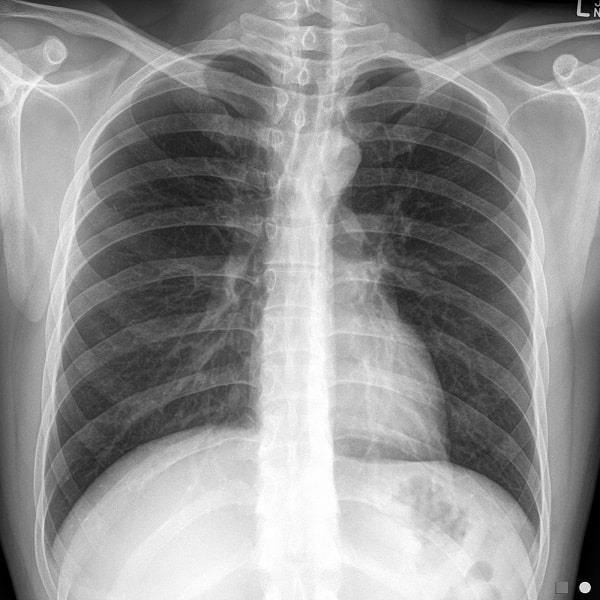
X-ray helps to evaluate heart status in atrial septal defect
- Electrocardiogram (ECG). Helps to assess heart rate well.
- Heart information. Your doctor will insert a small tube (called a catheter) into your heart to directly assess for heart defects. In addition, this test also allows measurement of valuable parameters in the assessment of congenital heart disease. This procedure is usually used for therapeutic purposes.
- Magnetic resonance imaging (MRI). Helps to evaluate the heart structure and comorbid conditions of the disease.
- CT scan. This test helps diagnose heart defects in cases where simpler tests do not clearly evaluate abnormalities.
8. How is this condition treated?
There are many cases that go away on their own after a few years. However, for large atrial septal defects that do not close on their own, treatment may be necessary. Cases of prolonged, non-closed atrial septal defect often still require surgery later.
Disease monitoring
If you or your child has an atrial septal defect, you should see a cardiologist and be closely monitored. Your doctor will evaluate the appropriate treatments and give you advice. Depending on the condition of the disease, the doctor will prescribe treatment at the right time.
Drug treatment
Medicines will not be able to completely treat atrial septal defects. However, they can help alleviate symptoms that bother you and affect your life. In addition, the drug is also used to reduce complications, prepare for surgery when needed. Some medications help treat arrhythmias and prevent blood clots.
Surgical treatment
For moderate to large atrial septal defects, your doctor will usually recommend surgery. This helps prevent future complications and improves health. However, once you have pulmonary hypertension, your doctor will not recommend surgery anymore because this can make the condition worse.
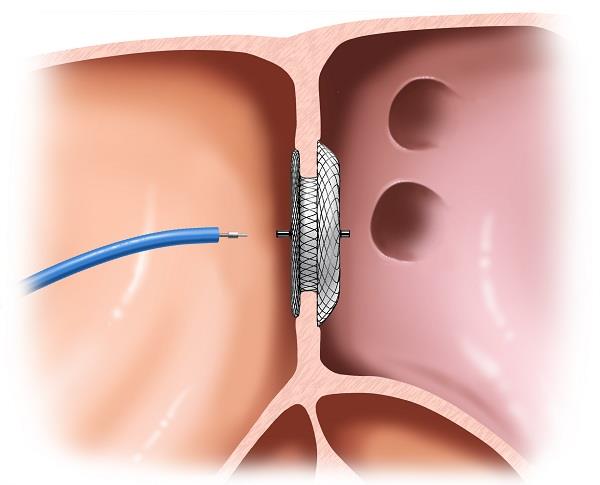
Cardiovascular interventional therapy with catheters can help correct atrial septal defects
For both adults and children, surgical treatment is aimed at sealing the opening between the two atria. Depending on the patient's condition, either cardiovascular intervention or open surgery will be performed.
Follow-up and follow-up
Re-examination depends on the type of deformity, the treatment performed, and other factors. You should contact your doctor for specific explanations and advice on how to monitor the disease. For adults with atrial septal defects, they should be seen regularly to evaluate for complications such as pulmonary hypertension, arrhythmias, heart failure, or valvular disease. Usually, these patients need reevaluation once a year.
Atrial septal defect is one of the most common congenital heart defects. This condition is usually mild, does not affect too much life, but severe cases can cause dangerous complications. The disease can be related to genetic factors, so you should see a doctor before and during pregnancy for the best monitoring and care. When you have any questions, go to the doctor or contact the doctor for answers.
Doctor Nguyen Van Huan